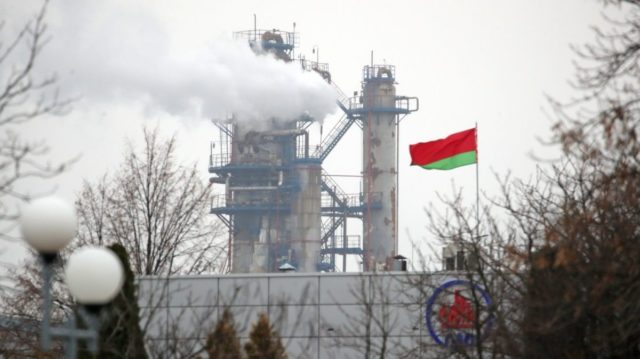
Belarus Struggles to Find Alternative Oil Supplies as Standoff With Russia Lingers
Publication: Eurasia Daily Monitor Volume: 17 Issue: 32
By:

Belarus continues to scramble in search of alternate oil sources two months after its traditional Russian suppliers halted flows through the Druzhba Pipeline (see EDM, January 22, February 13). The five suppliers that have provided Belarus with 90 percent of its oil for years cut off their exports on January 1. Since then, Belarus’s state oil company Belneftkhim has signed purchasing agreements with companies from Azerbaijan and Norway—and with non-traditional Russian suppliers—to try to make up the 18 million tons of crude a year it is losing.
Azerbaijan’s state oil company SOCAR has already agreed to supply 160,000 tons of oil to Belarus, and Belarusian Prime Minister Sergei Rumas met with SOCAR officials on March 2 to discuss additional purchases (Belta.by, March 3). Belarus will import SOCAR’s crude through a pipeline running from Ukraine’s main Black Sea port of Odesa to Brody in northwestern Ukraine. The oil will then be sent north to Belarus’s Mozyr refinery, a joint venture of the Russian oil giants Rosneft and Gazpromneft.
Belarus and Russia have tried several times to resolve what is ostensibly a pricing dispute but is really about Minsk dragging its feet on joining a federation with Russia, a move that would (de facto or de jure) eliminate Belarus’s independence. The talks have included several one-on-one meetings between Presidents Alyaksandr Lukashenka and Vladimir Putin.
Belarus wants its traditional suppliers, such as Rosneft, Gazpromneft, Surgutneftegaz and Tatneft, to remove a $10-per-barrel premium on the price they charge for crude. The four demanded the premium after Moscow exempted Belarus from paying export fees on Russian oil. At one point, the Russian exporters were losing $10 a barrel from having to absorb the export fees themselves. But Russia has since shifted its tax on crude from exporters to producers, prompting Belarus to contend that the premium it has continued to pay is no longer necessary.
Belarus used to receive Russian crude at prices far lower than the rate Moscow charged all other global customers. But it has raised prices to the point that Belarus says its discount is now only 17 percent. This means Russia should eliminate the premium, Minsk maintains. Putin appeared to offer a $2-per-barrel discount in a February 21 phone conversation with Lukashenka (Spglobal.com, February 21), but different interpretations of his proposal mean the price standoff has persisted (Naviny.by, February 21).
Although Belarus and Russia have had many oil and gas price disputes in recent years, the current Druzhba supply disruption is now the longest since 2004. A curious wrinkle, however, is that the Kremlin is allowing non-traditional Russian suppliers to deliver some of the supply that Belarus has lost.
First to step in were the sister companies owned by oil magnate Mikhail Gucheriev. His firms Safmar and Neftis agreed, on January 2, to send 750,000 tons to Belneftkhim. They have delivered some of the oil through the Druzhba Pipeline and some by rail (Sputnik.by, February 5). Since then, Russia’s RIA Novosti news organization has reported that UDS NEFT, Yanqpur and Tatneft also want to supply up to 1 million barrels of crude a day to Belarus (Interfax, February 21).
Meanwhile, US Secretary of State Michael Pompeo told Lukashenko in a meeting in Minsk, on February 1, that the United States would supply all of the oil and natural gas Belarus needs to help it maintain its independence from Moscow. In turn, Lukashenka expressed hope that the US would arrange low-cost loans for an oil pipeline running from the Baltic Sea through the Baltic States and into Belarus (1prime.ru, March 3).
Belarus is also working with Ukraine to bring the Odesa–Brody Pipeline online again. It has been idle since 2011 because oil delivered through it would have been much more expensive than oil pumped through the Druzhba. In a sign of how serious Belarus is about restarting the Odesa–Brody route, Minsk has established a fee schedule for the 40-kilometer stretch of pipeline that would need to be built from Brody to the Mozyr refinery (Neftegaz.ru, February 27).
Since the Russian shutoff on January 1, Belarus has been able to find limited alternative crude supplies for its refineries, whose exports of finished petroleum products are the lifeblood of the Belarusian economy. But the price of crude from those new sources has, in every case, been much higher than from Belarus’s traditional Russian suppliers. In addition, the volumes procured from those alternative sources has not been high enough to keep Belarus’s refineries at Mozyr and Naftan running at capacity. In January and February, the two processed 1.8 million tons of oil—half of what they did during the same period in 2019 (Belta.by, March 3). The price standoff with Moscow is also depriving Belarus of income from the 6 million tons of Russian oil a day that it usually re-exports. Finally, the contracts with alternative suppliers have so far all been short term, a sign that Belarus does not intend to replace Russian deliveries for good. As long as all that remains the case, Moscow will be able to maintain a tough position in the price talks, perceiving that Minsk lacks leverage.



